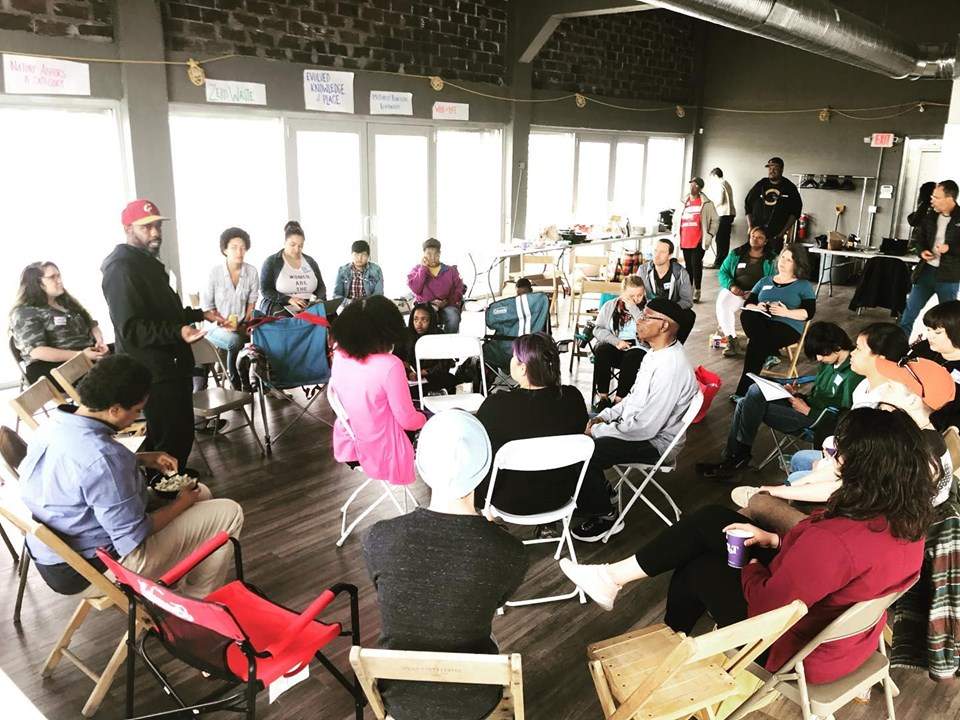News Take Action
Just Transition Retreat at Silo City
| Date: | July 10, 2019 |
| Share: |

For four days towards the end of May 2019, over 30 community activists and social justice workers came together for a climate justice and ecological training at Silo City in Buffalo, NY. The training was hosted by Buffalo’s Crossroads Coalition, a group of local nonprofit organizations who are working together to ensure frontline communities and communities of color lead the transition for Buffalo from an extractive economy to one that is regenerative. The facilitation team included guests from Oakland-based organization Movement Generation who offered a version of their popular Justice and Ecology retreat tailored to the Buffalo social justice and climate ecosystem.
Rooted in the “Just Transition” framework, the retreat’s goals included developing a framework of understanding around the current ecological, social, and economic crises both globally and locally, and beginning to devise movement interventions that foreground renewable and regenerative practices. A Just Transition defines a shift to an economy that is ecologically sustainable, equitable, and just for all its members. Our current economic ecosystem is one that is dependent on the extraction of finite natural resources in order to serve a few at the expense of the many. The Just Transition framework looks at the moment when those resources run out: will the transition be fair? Who stands to be left out?
Sarah Wooton, Community Researcher at Partnership for the Public Good and member of the retreat planning committee, noted the importance of localizing this framework. “The planning committee’s goals were to take the Just Transition framework, which illustrates the intersectionality of climate, social and racial justice, and merge it with a local understanding of Buffalo’s economic and social history.”
Topics and activities covered during the training included visualizing the ecological history of the world to explore the concentrated impact extractive processes have had on the environment, a “web of life” activity that illustrated the interconnectedness of the natural systems life forms depend on, and a workshop demonstrating the “control mythologies” or false truths that prevent communities from harnessing “people power.”
Participant Andrew Delmonte, Director of Cooperative Development at PUSH Buffalo explained, “As someone who works in the realm of entrepreneurship and economy (the management of home), the retreat challenged me to think of that work in terms of ecology (the knowledge of and relationships of home). Our ecology relies on biological diversity. What if our economy was structured around the strength of our cultural diversity? What if our businesses relied on the cooperative management and ownership of diverse people with diverse skills? Movement Generation says that “social inequity is a form of ecological erosion.” So, as we work to restore our economy to work for all people, our solutions must bring those that participate in the economy with their labor back into balance as actors in the economy and in the web of life.”
The Silo City site offered an introductory perspective into Buffalo’s ecological systems. Over the course of the four days, Silo City staff, including Maris Grundy, Paul Fuhrmann, and Josh Smith, led the participants through a brief history of the site, and the devastating ecological impact incurred by the industrial processes over the past century. The participants then spent some time learning about the regenerative practices Smith has introduced along certain stretches of the river and grounds to counter growth by invasive plant species, increase plant and microorganism diversity, and lower the pH level of the soil. An ecological lens that encompasses an understanding of basic principles of ecology, natural cycles and processes becomes the basis for a shared inquiry into the causes of our current ecological crisis and a space to begin thinking through bold and creative strategies for a just transition.
This news post was written by Zainab Saleh, Program Coordinator at PPG.
[Photo credit: Josh Smith]